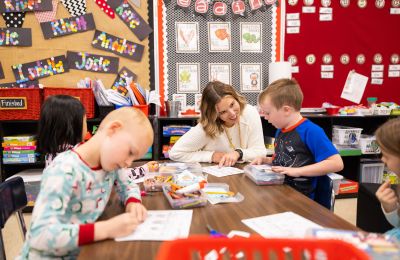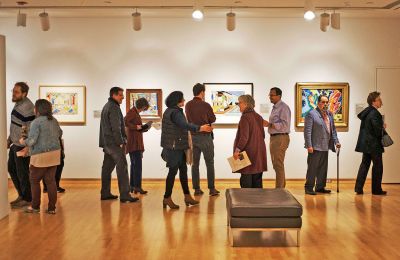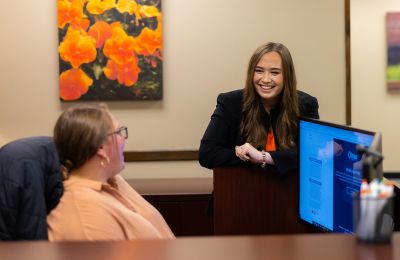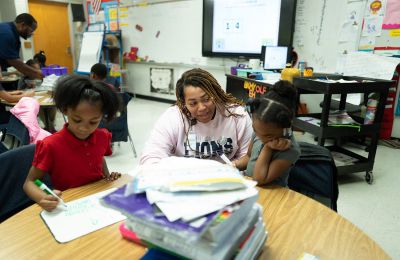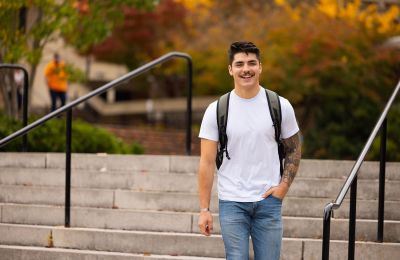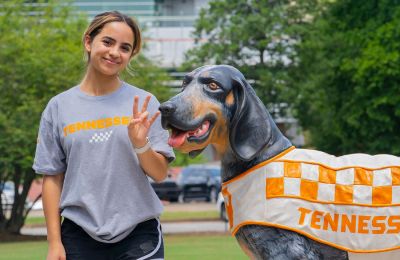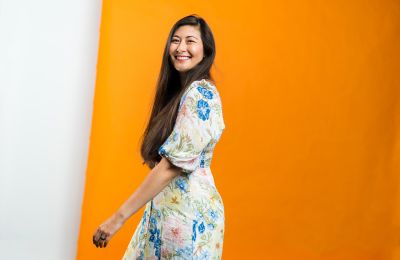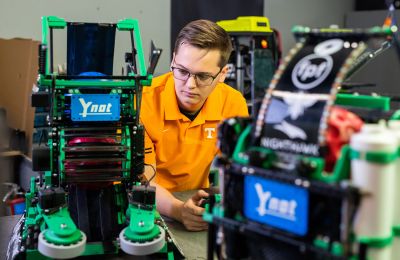Callie Canfield and her friend Matthew Bradfield stood in line at Subway one afternoon, looking to grab a quick bite to eat on campus. As the two approached the counter, Bradfield reached for his iPad. He doesn’t communicate verbally and uses the device to help him speak. Moving too quickly, the server looked to Canfield and asked what Bradfield wanted.
She’s probably never interacted with someone that uses a communication device, Canfield thought.
She smiled at the server and explained Bradfield’s process. By gently redirecting the conversation, she helped the server realize the mistake and allowed Bradfield time to use his iPad. Bradfield regained control of the situation while the server learned a new skill for interacting with future customers who might communicate similarly.
“Moments like that can be frustrating at first, but I have to remind myself that I have a little bit more knowledge about alternative communication than most people,” says Canfield, a senior studying audiology and speech pathology. “It’s important to educate people about what’s happening, because not everyone has a full idea about different communication devices.”
Thanks to a little patience and respect, the interaction was a positive experience for everyone involved. For Canfield, that’s what it’s all about.
Forming Connection
Canfield came from Chicago to the University of Tennessee, Knoxville, with a clear purpose: to help others find their voice. She sought out UT so she could study speech pathology, a field that had piqued her interest in high school. Canfield took sign language classes and was an active member of Best Buddies, an international organization that creates friendships and opportunities for people with disabilities. Through her involvement, Canfield saw connections between supporting her friends and the career she wanted to pursue.
“I feel like everybody should have their own voice,” Canfield says. “Finding solutions to make sure that’s the case for everyone is how I got more interested in things like augmentative and alternative communications.”
At UT, Canfield continued her involvement with Best Buddies, joining the campus chapter as soon as she arrived for her first year. As an out-of-state student, the welcoming environment eased her transition to Knoxville and fostered immediate friendships—like the one she shares with her buddy Elise McDaniel, a student in UT’s FUTURE program.
FUTURE helps young adults with intellectual and developmental disabilities make a successful transition from high school to adult life. Housed in the College of Education, Health, and Human Sciences, FUTURE was founded in 2011 as part of a federal grant to promote inclusive education. In 10 years, it has become a national model for how to provide young people who have intellectual and developmental disabilities with access to postsecondary education.
Program Coordinator Emma Burgin explains that FUTURE “not only provides a pathway to work but also provides the opportunity for individuals with intellectual and developmental disabilities to be socially included, work on independent living skills, and just improve their overall quality of life.” The backbone of that work lives with FUTURE peer mentors, who support students in the program.
Canfield naturally got involved with FUTURE and volunteered to be a peer mentor after meeting McDaniel. Her responsibilities in that role include helping with the day-to-day campus lives of FUTURE students by offering academic tutoring, in-class support, and job coaching, among other activities.
“Callie is a mentor who goes above and beyond to be inclusive in everything she does,” says Burgin. “She is extremely knowledgeable and skilled, but she also leads with compassion. Callie has this unique blend of heart and ability that sets her above her peers. She’s been a standout leader and advocate for our community.”
During her junior year, Canfield discovered an opportunity to integrate her coursework with her role as a mentor. She crafted a communication plan for Bradfield, and together they worked on his skills and confidence communicating independently with an iPad. Bradfield had been using a whiteboard to communicate previously, so his adoption of assistive technology was a significant shift. Using the device can be intimidating, and a big part of Canfield’s role was encouraging Bradfield—as in their practice at Subway—and breaking down the stigma associated with alternative communication.
“You learn better by doing and getting that real-life experience. I have so many opportunities to actually use what I’m learning in class to help out my friends,” she says. “There’s this saying on campus, ‘Vols help Vols,’ and it really is how we do things here.”
Canfield, who is minoring in American Sign Language, specializes in working with deaf students in addition to her involvement with FUTURE. Accompanying students to class, assisting with study sessions, and serving as an internship mentor are a few of the many ways she uses her ASL skills to assist other students. Helping people diversify communication is important to her because the more ways someone can connect with others, the stronger their relationships will be.
Building Community
At the core of Canfield’s work is creating genuine relationships with other students. This past year she took over as chapter president of Best Buddies, serving in leadership and giving back to the organization that welcomed her to campus. As president, Canfield facilitates buddy matches by interviewing prospective students to pair with FUTURE students who have similar interests. The Best Buddies executive team works in partnership with FUTURE staff to best meet the needs of every student through a thoughtful process that’s extremely thorough to ensure that pairings are successful.
Canfield and her current buddy McDaniel were matched together in their first year at UT. Their shared love of athletics and their bubbly personalities meshed well instantly, and they have stayed together ever since. In fall 2021, for the first time in UT’s history, students with disabilities were offered invitations to join Panhellenic chapters. McDaniel participated in sorority recruitment, and Canfield shadowed her during the week-long process, helping her with accommodations as needed and guidance in making her selection. McDaniel accepted a bid from Alpha Omicron Pi.
It was an exciting experience for McDaniel and a little emotional. “I cried when I went into the house. It was fun joining all the sisters,” she says.
Through recruitment week, residence hall sleepovers, and weekend trips to the lake, Canfield and McDaniel have nurtured a strong bond and supported each other as they reached major college milestones. This spring they’ll graduate together, starting and ending their collegiate journey as best friends.
“Elise has taught me a lot about working through challenges and proving people wrong,” says Canfield. “A lot of times people underestimate her. But Elise shows them who she is through her hard work. We’re each other’s biggest fans, and I can’t imagine my time at UT without her.”
Even after graduation, Canfield is confident that she and McDaniel will remain constants in each other’s lives.
Canfield plans to get her master’s degree in speech pathology and work with people with disabilities and children who use communication devices. In connecting her passion for inclusion and her work with the disability community, Canfield is building a career path with purpose—one that allows her to combine all of her talents to help others.




